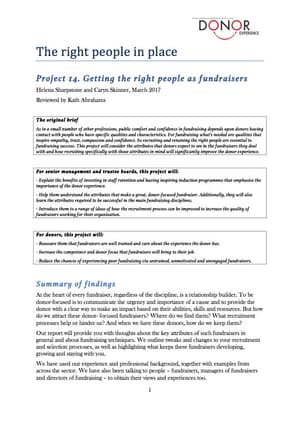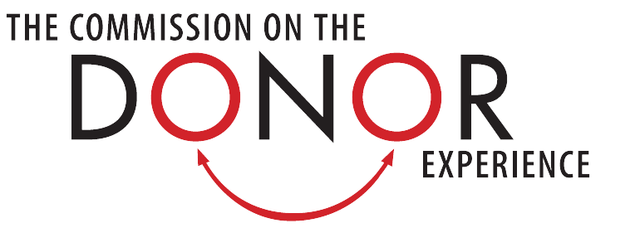CDE project 14: appendix 2 and 3
- Written by
- The Commission on the Donor Experience
- Added
- April 24, 2017
Appendix two
Examples of donor-centred behaviour in fundraisers as described to us by those we interviewed
- Sending a handwritten note to a legacy pledger who had recently lost a good friend.
- Our DM fundraiser is donor centred in that she carefully approaches each activity with the aim of giving the donor the best possible experience in terms of materials and seeing how their donation makes a difference, through to making a donation and being thanked.
- I know a fundraiser who writes highly personal thank you notes, is brilliant at telling stories specific to each donor, brilliant at keeping records and showing real care, has obvious interest in the donors and attention to detail. She focuses not on what she wants, but on what the donor wants. And she's passionate about the cause.
- A major donor fundraiser who continually found ways to engage, update and involve funders and potential funders. Both directly through personal contact and by providing 'inside access' to high level staff, new and emerging plans and ideas.
- Personally delivering a bouquet of flowers on a donor’s 70th birthday.
- Sending off a birthday card to an elderly lady who she had spoken to on the phone earlier that day.
- Build understanding of donor motivation and needs. Tailor interactions to fulfil these needs. Every response (even the negative ones) is valued Provides options and opportunities for engagement. Personalised approach. Expresses impact in personal (not organisational) terms Stewardship is donor defined (frequency / channel / content).
- Representing donors’ view in a large charity and renegotiating service delivery as part of a gift.
- I have a major donor manager who is extremely donor centric. Excellent interpersonal skills combined with an ability to identify what the donor needs. Those needs are then skilfully met often using others and ensuring they are extremely well briefed.
- Head of alumni fundraising is the voice of the donor in every conversation we have. We want to be sure the donor is heard.
- A legacy fundraiser who knows the supporters so well and has a genuine relationship with them. They’re people, not donors, they’re called by name and treated as part of the family.
- The relationship between YouthNet and Vodafone. The fundraisers who worked on the account genuinely tried to meet the needs of the business and understand what the partner was trying to get from the relationship. Worked with them and assigned the right people, rather than having a transactional relationship.
- All our donors are friends. They’re in our phones, we text and WhatsApp them. We go out to dinner with them. We are invited to their major events and asked to speak. We appeal to their preferred medium of communication. They tell us “We give to you because of the way you treat us.”
- A fundraiser with a close relationship to her donors. She remembered their birthdays and things they liked – she brought one some maple syrup back from Canada once, sent them articles they may be interested in. More informal, less corporate.
- A trust fundraiser who was applying for a £50 k donation. When she met with the trust she was totally in charge and scrupulously researched. She impressed them with how she’d understood them and the application.
Appendix three
Research sources
- Insights Discovery profiles – based on the work of Carl Jung, these profiles measure behavioural preferences across a range of fundraising disciplines. The model is accredited by the British Psychological Society.
- One-to-one interviews with a range of fundraising directors, managers and fundraisers themselves. Ten people were interviewed using standard questions.
- Focus group – conducted at the IOF Convention 2016.
- Dr Beth Breeze, Director, Centre for Philanthropy, School of Social Policy, Sociology and Social Research – her work on the attributes of major donor fundraisers
- Survey – conducted via an email link to a mailing list of approximately 800 contacts with 24 responses.



















